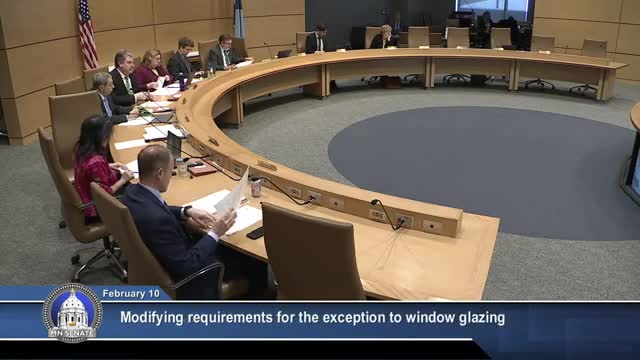Committee backs bill allowing permanent medical window-tint prescriptions without biennial renewal
Get AI-powered insights, summaries, and transcripts
Subscribe
Summary
Senate File 1075 would let physicians designate window-tint prescriptions as permanent so patients with chronic light-sensitivity would not need to renew every two years; the measure passed the Transportation Committee and will go to the Senate floor.
The Minnesota Senate Transportation Committee on Feb. 10 approved Senate File 1075 and sent it to the Senate floor after testimony that the bill would let physicians mark window-tint prescriptions as permanent for patients with lasting light-sensitivity conditions.
Senator Howe told the committee current law requires drivers with medical exemptions for window tint to reissue a physician's slip every two years due to a statutory change in 2008; the bill would permit a physician to designate the condition as permanent so the patient would not need biennial renewal. Retired state trooper David Sutherland recounted his wife's experience with a permanent brain injury and related light sensitivity, saying her doctor prescribed window tint, and later the couple learned the statutory requirement for renewal. “At this time, I contacted Senator Howell on the situation and recommended that 169.71 be amended to when a doctor or physician indicates medical condition is permanent, that that prescription is for lifetime,” Sutherland testified.
Committee members discussed practical enforcement and identification. Senator Farnsworth asked whether a visible marker could prevent repeated traffic stops; Sutherland suggested adding a notation to vehicle registration that a permanent tint exists, similar to a license restriction. The sponsor said the idea was worth pursuing but could trigger a fiscal note and suggested keeping the bill moving and returning later to consider registry changes.
Senator Carlson and others offered clinical examples — including porphyria and severe light sensitivity — supporting permanent exemptions. Questions also touched on enforcement practice changes adopted in recent years and whether officers can stop vehicles solely for expired tabs or tint enforcement.
Senator Howe moved that Senate File 1075 be passed and re-referred to the Senate floor; the motion carried on a voice vote. The transcript records no roll-call tally. Committee discussion produced no statutory text changes in the hearing; the committee did not finalize any registry amendment during the hearing and deferred that idea for potential later drafting and fiscal analysis.
